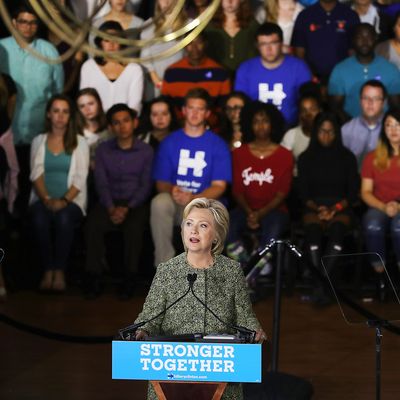
First, they killed off the movie business, golf, and the bar of soap. Now millennials are coming for Hillary Clinton’s presidential campaign. Or so recent headlines seem to suggest.
Over the past two weeks, the Democratic nominee has seen her polling advantage over Donald Trump swiftly erode — and her dwindling popularity with younger, left-leaning voters is a major reason why. In late August, Quinnipiac put Clinton ahead of Trump by 24 points among voters under 35; today the pollster has her winning the demographic by just 5. Likewise, Fox News had Clinton besting Trump by 27 with younger voters last month, but has her beating him by only 9 today.
Millennials are uniquely uninterested in making America great again. Polls frequently find Trump in fourth place among voters under 30. But younger liberals appear more likely to go third party than their boomer counterparts, as some surveys find more than a third of the demographic backing Gary Johnson or Jill Stein.
That’s a problem for the Clinton campaign. For most of the summer, the Democratic nominee has concentrated on a negative message, working to convince moderate Republicans to abandon their incompetent, racist nominee. But this strategy has won over few suburban conservatives, while doing nothing to persuade younger voters who know they hate Trump — but aren’t sure how they feel about the Democratic nominee, either.
On Monday, Hillary Clinton turned her attention to these unimpressed youngsters. In the morning, she wrote a blog post for Mic, a news site for millennials (specifically, for millennials who aren’t offended by the suggestion that they are incapable of reading news sites for adults). Then Clinton addressed a crowd of her most Snapchat-savvy supporters in Philadelphia.
“You want something to vote for, not just against,” Clinton said. “Even if you are totally opposed to Donald Trump, you may still have some questions about me. I get that.”
Clinton’s blog post and remarks reiterated many of her campaign’s long-running themes: the need for America to reject Trump’s bigotry and embrace diversity, her passion for the details of public policy, her firm belief that “love always trumps hate” (and, apparently, that this pun never gets old).
But Clinton’s attempts to give millennials something to vote for departed from her general pitch in two ways. For one, she placed more emphasis on her autobiography, connecting her current political ambitions to the “social-justice activism” of her youth. For another, she endorsed a Bernie Sanders–esque vision of political change, imploring her young supporters to stay mobilized after she is elected and work for more radical changes to our politics in the long term.
Clinton said she recognized that, with Washington “paralyzed by big money and partisanship,” the gap between “the change we want” and what our system “delivers” is great. Similarly, in her Mic essay, Clinton wrote that to enact her progressive agenda we’ll need to get rid of the “secret unaccountable money poisoning our politics.”
But she implored younger voters to stay engaged and help her eliminate those political constraints.
“I need you as partners not just for winning this election, but the fights ahead of us over the next eight years,” Clinton said in Philadelphia, while writing in Mic, “I need you to work with me, keep fighting for what you believe, hold me accountable.”
Beyond this nod to the “political revolution” theory of change, Clinton worked to redefine herself as a progressive crusader rather than the unreliable, “corporate” Democrat Sanders cast her as during the primary.
Clinton suggested that the origins of her politics lay in the story of her mother: Abandoned as a child, Dorothy Rodham was “saved by the kindness of others,” a fact that taught her daughter that “no one gets through life alone.” Clinton proceeded to describe her time working for the Children’s Defense Fund and serving as an “activist” First Lady who won health-insurance coverage for 8 million children.
In her Mic post, Clinton drew parallels between how the world looked to her upon graduation from college and how millennials tend to describe the world that confronts them today.
The Democratic nominee also peppered her speech with anecdotes about vulnerable minority children, remembering a little girl in Nevada who wept at the thought of her parents being deported, and a little boy in Flint, Michigan, who was sick from “water poisoned with lead.” While Clinton never mentioned the existence of third-party candidates in either her speech or blog, the anecdotes seemed to convey a message to the Jill Stein–curious: Before you “vote your conscience,” please think of the children.






























